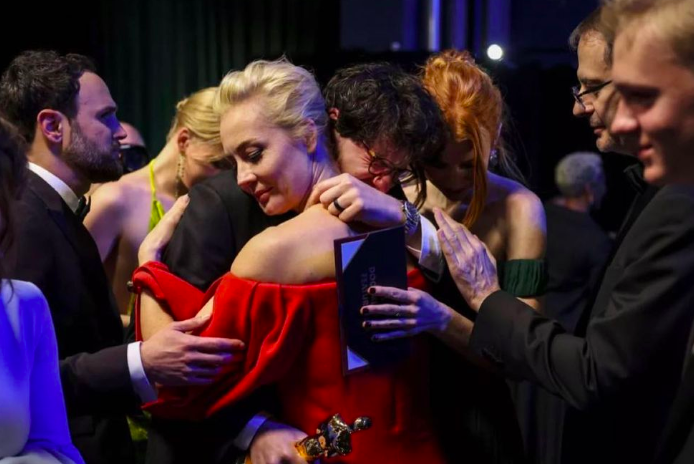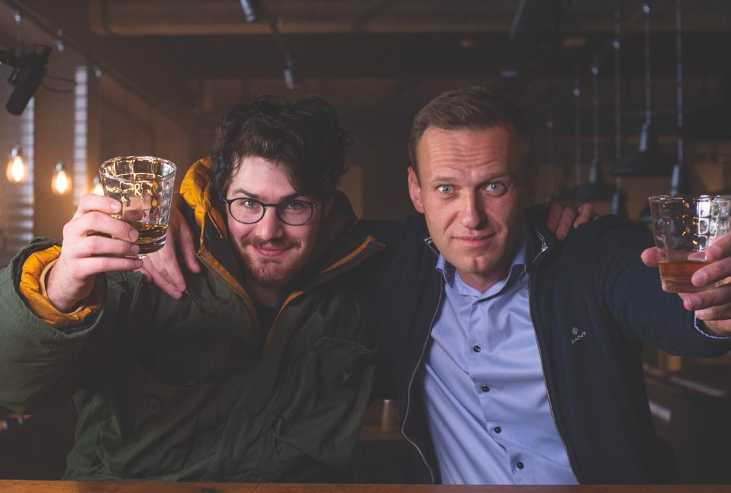
Listen to the story here:
When Daniel Roher, surrounded by Navalny’s wife and two kids, stepped on stage to accept the award, he dedicated it to all the political prisoners around the world and to Navalny, who currently remains in solitary confinement in a Russian prison.
The Etobicoke School of the Arts graduate won an Oscar for best documentary at the 2023 Academy Awards for his film, Navalny.
The documentary follows the story of Russian opposition leader and anti-corruption activist Alexei Navalny, who survived a poison assassination attempt in August 2020, and the search for answers along his road to recovery.
We caught up with Roher, 30, over the phone from New York City to talk about coming up as a filmmaker in Toronto, advice for the next generation, and finishing what you start.

OTR: How did your experiences at Etobicoke School of the Arts and growing up in Toronto shape your filmmaking?
Daniel Roher: Well, I was from a very early age incubated in a very creative environment. My parents were very supportive of my creativity, and they really fostered it and that was pivotal.
And then of course in high school, I went to Etobicoke School of the Arts, and E.S.A. similarly is a creative atmosphere where you are encouraged to explore and create and think outside the box, and make things and destroy things, and make things and then destroy them again.
That teaches you how to be a creative and encouraged me to pursue the things that I wanted to pursue. I’m really glad that I went to that school because if I went to a normal high school, I wouldn’t be where I am today, without question.
What advice would you give the multitude of young aspiring filmmakers in Toronto?
The most important thing I would say is finish it. Whatever you start, finish it. It’s really easy to be inspired by the nucleus of an idea. You get all jazzed and you’re excited, but then the grind of execution wears people down, and all of a sudden you have a project that’s unfinished on a hard drive.
Finish what you start and develop a creative community around you. Find like-minded people. And if you’re a filmmaker, you have to be the leader. You have to be the one to inspire, and organize, and get people together. When I see people who have those qualities it very much reminds me of myself and keys to my own success.
The other thing I like to say to people is that I always approached my work, and my dream to be a filmmaker, as if I was a professional athlete.
So you think of what a pro hockey player has to go through to be a pro hockey player. Every single facet of their life is (focused) towards performance – what they eat, when they sleep, when they train, when they rest. It’s all about achieving their athletic performance. That’s how I approached my career when I was younger. I worked at it like I was a professional athlete. Every free moment I had I dedicated towards the craft and absorbing art and culture to further my craft.
When you started working on Navalny, I’m sure it would have been hard to imagine the reach this documentary would have. What had you hoped this film would accomplish?
When we were making the film, we had a very clear indication that we had a responsibility to Navalny himself. He was going back to Russia, we knew that he’d be arrested and there was a high probability he would be languishing in a gulag somewhere.
We all understood that this project we were working on would be a vehicle to keep the name in global consciousness and on people’s minds. In this age of a five-second news cycle, how do we keep Navalny in the conversation? That was the mission of the film.
How did your time at Savannah College of Art and Design in Georgia affect your career?
It illustrated to me that I don’t want to be in university or college. I feel bad saying this to a college newspaper, but it just showed me very quickly that if I want to do the thing that I want to do, I don’t need a formal education to do it.
If you are industrious, you can just go learn how to do these things. It’s not like medical school. I would need someone to teach me how to do brain surgery. But I don’t need someone to teach me how to make a film. I can learn that stuff by doing, and literally with YouTube tutorials. You know, I’m an Academy Award-winning filmmaker now and I learned how to make films on YouTube. That’s a pretty extraordinary context.
If your parents are super minted, if you’re a super rich kid and you need something to do with your life, go to film school, I think that’s terrific. But not everyone has that and you can learn a lot just by being industrious and asking people to volunteer on your set and learning how it all works.
What was it like being up on that stage and knowing that your film had been recognized as the best documentary of the year?
Being on that stage, still overwhelming, exciting, and all of those things. But more than anything the reason why it matters to me is because I had the opportunity to deliver a very forceful message.
Calling out authoritarians around the world, and authoritarianism wherever it rears its head on one of the biggest platforms imaginable in front of 20 million people – that’s meaningful, that matters.
As we’re having this conversation, in Israel for example, which is a country that I care deeply about, the horrible Prime Minister of that country is trying to overhaul the judicial system in a way that would very much erode the democratic traditions and undermine the democratic traditions of the country. It’s situations like that, that really make a win like this matter. That’s why I was excited to be on that stage – because I felt like I had something to say, and I’m happy that I got to say it.
Listen to an edited version of the interview here:
This interview has been condensed and edited for clarity
Trevor Carter is a reporter for On The Record, Winter 2023.
This article may have been created with the use of AI tools such as
Trevor Carter is a reporter for On The Record, Winter 2023.

